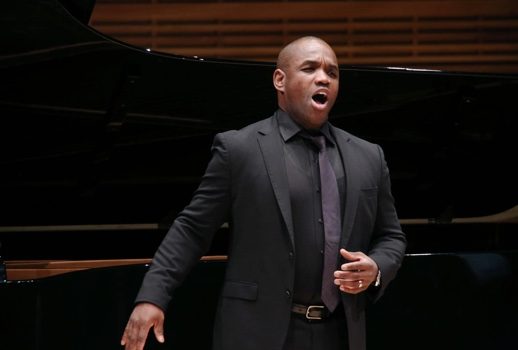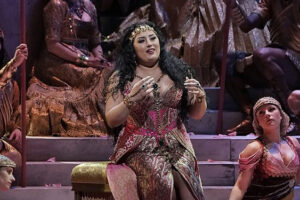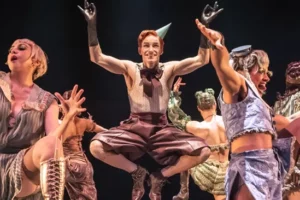

He’s the kind of gallant, broad-smiling vocalist you can easily see complimenting your mom and meaning it.
Lawrence Brownlee, star tenor of stage and NFL games, wholehearted salsa enthusiast, bringer of Autism Awareness, is a real “pillar of the community.”
He’s the kind of gallant, broad-smiling vocalist you can easily see complimenting your mom and meaning it, gumming down her potato-leek stew, blithely answering your brother’s questions about that “weird oowa-oowa-oowa” thing opera performers do, and then all but leaping out of his chair to do the dishes while you’re indisposed upstairs, too busy clutching your blanket and bawling beneath the glow-star ceiling stickers in your childhood canopy bed because dad doesn’t know you and never did to be bothered.
His singing is equally menschlichkeit. As we learned Tuesday night at Zankel Hall over the course of two very “pretty” but somewhat blandly performed song cycles by Schumann and MacArthur grantee Tyshawn Sorey, Brownlee gives good, earnest heart as a solo recitalist but has yet to prove himself a memorable interpreter of song.
The problem isn’t the voice, which is among the very best in the business. Round and bright and Met Grand Prize-winning, with an unusually tight vibrato that sometimes bleats, Brownlee’s youthful tenor shows a pliant versatility that dares composers and producers to come up with new works and new stagings; it’s also done much to nourish the public’s perceived hunger for yucky new bel canto stagings.
He’s put his imprint on a variety of genres, impressing in Rossini, Bellini, and even Strauss at the Bayerische Staatsoperearlier this year. And like many a prodigal of his generation, the Youngstown, Ohio native delivers a mean melisma: Brownlee’s 2013 album with pianist Damien Sneed, Spiritual Sketches, showed great crooning flair for African-American church music.
Or, his star turn in the Apollo’s 2016 production of Charlie Parker’s Yardbird, for which he navigated some tortuously finicky vocal writing before a crowd of opera neophytes and brought some of the more sensitive among us to tears. (I wouldn’t know because I’m subhuman and never cry.)
Nor is the problem his fan base, which appears to be solid, and ravenous. On Tuesday at Carnegie, there was nary an empty seat in the house, with spectators poised at the ready to stand for him. Brownlee entered beside pianist Myra Huang looking smart and sharp in a black suit—a look he wears well: pictured in repose in a leather jacket on the front page of his website, he evinces less opera singer than neo-soul stylist—and proceeded to give a Dichterliebe reading that was serviceable but strangely low on drama.
Coauthored with Heine, Schumann’s opus 48 is a prime specimen of German Romantic histrionics. Performed to its potential, the cycle should conjure a tidal death-progression of boyish enthusiasm, dejection, rage, and then resigned cynicism over being spurned.
(For the love of Gott, has there ever in history been a Teutonic poet who wasn’t spurned? I’d love to see Heine turn up for a consultation with Patti Stanger. “Can’t hold on to your liebe Frau, huh?” I imagine her clarifying while Müller weeps in a corner. “Listen, buddy, if you just think life’s a party, you’re gonna end up being the last schmuck at the party to leave!”)
Dichterliebe, bouncing between fantasy and witty, underhanded sarcasm, offers plenty of chance for theatrics. Yet Brownlee, taking it seriously, shirked so many of these opportunities, offering sensuous legato and the occasional upturned hand on lieder like “Wenn ich in deine Augen seh’” and “Ich hab’ im Traum geweinet,” but little else.
His take on “Ich grolle nicht” was a case in point. Set to a triumphant pulse of heroic chords—a favorite motif of Schumann’s, cf. “Er, der Herrlichste von allen” from Frauenliebe und -leben, though the tonal similarities end there—the piece is theatrical gold, providing the performer with a closet of emotion so repressed, it’s practically Viennese.
“I bear no grudge,” declares the deserted poet, though the melody grows increasingly urgent as he betrays his own feelings and ultimately winds up shrieking about how “pitiful” his love is.
Aside from one stomp of the foot in the first stanza, Brownlee instead went for beauty, serving a soaring climax that cleared the piano but appeared to miss the point of the song entirely.
Too bad, as the pianist was a revelation. Rarely have I heard the twinkling that underscores “Und wüßten’s die Blumen, die kleinen” played so cleanly and articulately as in Myra Huang’s hands, or the driving rhythms of “Das its win Flöten und Geigen” (in which the poet sardonically evokes his estranged lover dancing at her wedding) with such twirling sweep. No mere accompaniment, Huang brought the drama where the singer left his at home. The result was a Dichterliebe that felt oddly freshman for a tenor as able as Brownlee.
Following intermission, the New York premiere of Cycles of My Being, a short set of five songs by American composer Tyshawn Sorrywith text by Terrance Hayes. A quartet of instrumentalists joined the singer onstage—violinist Randall Goosby, cellist Khari Joyner, clarinetist Alexander Laing, pianist Kevin Miller—as well as the composer himself, who conducted from among them.
Like the Schumann cycle preceding it, Sorey’s opus also explores themes of mourning and disappointment—only this time not with an estranged girlfriend, but instead with a racist system that forecloses on hope.
“America… Do you love the air in me as I love the air in you?” wonders the narrator of “Inhale, Exhale,” a doleful poem that sets the mood for the rest of the songs.
While Heine’s poetry paints from a broad psychological palette, Hayes’ verse, moody and maundering, tends toward the more thematically monochrome, churning through the endless cycle of hatred and hope many experienced by many African-Americans in the margins. The music doesn’t do much to complicate the mood, unfortunately: these songs crouch in a sepia-toned bog of dissonance taken lentissimo, with little relief from the sobbing clarinet.
Sorey is in fact a fair writer for strings, and there were moments of insight. The perpetual beat for violin and cello, for instance, first found in “Hope” and later resuscitated in the cycle’s coda, “Each Day I Rise, I Know,” recalled the best of early Steve Reich. The music also provided shreds of almost Thomsonian clarity to lines like “When angry, hope is a blade/When wounded, hope is what heals me,” with the piano shellacking Hayes’ repetitious lyrics like a salve.
From his place behind a music stand, Brownlee was sonorous (some exquisite runs in “Each Day I Rise”) but mostly unexciting, a mere cog in an ensemble. How nice it would’ve been to see more dynamic range from him—and (dare I say it of a MacArthur “genius”?) from the music.
Of course Brownlee had to encore with an absolutely sparkling rendition of one of my favorite Hoagy Carmichael tunes, “The Nearness of You,” a choice that, while unadventurous, was all the redemption we needed from an otherwise flat evening. Brownlee’s voice, on its own, is certainly beautiful enough to handle such material. If only he had the romantic audacity to let himself muddy the waters from time to time.
Photo: Steve Sherman























Comments